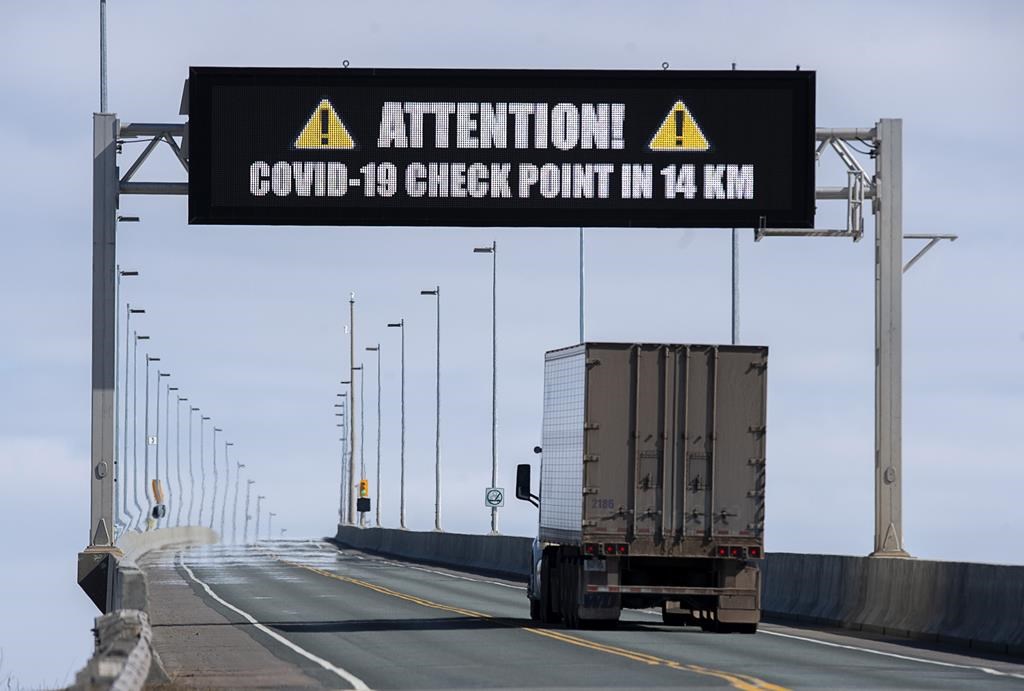This is the third in a series of stories looking at the new reality of life during the COVID-19 pandemic in the Maritimes. You can find the full series here.

New Brunswickers may have just become comfortable with the idea of household bubbles but two Maritime premiers are looking to put a new spin on the concept, by becoming bubble provinces.
Household bubbles are a practice that allows two households to form a single unit and drop physical distancing restrictions.
READ MORE: What are household bubbles and why New Brunswick is using them in response to COVID-19
Now, Prince Edward Island and New Brunswick are in discussions to open up travel between the two provinces.
“You know, we do need to begin to get some economic activity rolling in both provinces,” said P.E.I. Premier Dennis King. “We do seem to be on similar trajectories so it does seem to make sense at first blush at least that we would be able to work together with some kind of bubble province arrangement.”
New Brunswick Premier Blaine Higgs said that he and his P.E.I. counterpart have had “several discussions’ on the topic.
“We’re both tracking as we open up to see where things move,” Higgs said.

New Brunswick and P.E.I. have had similar experiences dealing with COVID-19.
Case counts in both provinces have remained below the per capita national average, both took early and decisive actions to limit travel across their borders and now, they each are looking to cautiously reopen in a bid to spur their stalled economies.
P.E.I. closed the Confederation Bridge to travellers on April 1. New Brunswick banned non-essential travel on March 25.
Since then case levels have flattened in both provinces. New Brunswick has 120 confirmed cases; P.E.I. has 27.
The situation is much different in the third Maritime province.
As of Friday, Nova Scotia has had more than 1,000 confirmed cases and over 50 deaths.

Get weekly health news
It’s a reality that has the province on the outs, while the other two discuss bubbling up.
“We’re going to continue to focus on ensuring that we flatten the curve here when it comes to COVID-19,” said Nova Scotia premier Stephen McNeil when asked about the prospect.
McNeil also noted that Nova Scotia never implemented the same level of border restrictions as New Brunswick and P.E.I.
“We as a province have not locked down our province like our sister two provinces have,” he said.
“We’ve certainly restricted access, we’ve told Nova Scotians to go home and self-isolate, and we’ll continue to move along the path that we’re on and focus on the health and safety of Nova Scotians.”
People crossing the border into Nova Scotia are stopped, questioned and advised about the public health rules in the province, but conservation officers don’t have the authority to turn travellers away.
In New Brunswick, about 39 vehicles are turned away from the land border each day.
The restrictions are sure to have an economic impact on all three provinces, each of which depends on busy tourist seasons each summer.
“The Maritime provinces, maybe better than any other part of Canada, can be thought of as, in the minds of people, as a unit, almost as a tourism product unit if you will,” said Lorn Sheehan, a professor at Dalhousie University’s Rowe School of Business.
But without visitors to sustain them, tourism operators stand to die off.
“It’s devastating for the industry,” said Sheehan. “It’s already an industry that has been decimated.
“It’s an industry that’s going to continue to suffer loss of businesses over the summer months if we don’t have some kind of rebound.”
In New Brunswick’s efforts to help engineer a rebound have already begun, with premier Higgs suggesting people “discover our own province.” The government recently launched a new ad campaign with the tag “Hope Restored.”

Opening up the Confederation Bridge to allow travel between New Brunswick and P.E.I. could be a boon for industries in both provinces.
“I think as we move forward to try to save something, as it were, out of this summer’s tourist season, I really do think that the regional travel possibilities are where our best bets lie,” Sheehan said.
What’s less clear is how much demand for travel there will be this summer.

Sheehan says there could be two camps of people: some who don’t feel comfortable travelling and others who will be highly motivated to travel as much as possible after a spring spent in lockdown.
“It’s one thing to lift the travel restrictions, it’s another thing to know that consumers in their own minds will feel comfortable travelling even if restrictions are limited,” he said.
“We would benefit greatly from allowing for some interprovincial travel that would support the industry perhaps to a level that would allow businesses to make it through the summer. It’s really a question if businesses can make it through the summer.”
Legal limits of Border Restrictions
When it comes to interprovincial travel, any restrictions imposed by provinces lie in sticky constitutional territory.
“What’s being done in response to the pandemic limits a whole series of charter rights,” said Wayne MacKay, professor emeritus at Dalhousie’s Schulich School of Law.
“But the critical question is whether or not it is a reasonable limit in a free and democratic society.”
Section 6 of Canada’s Charter of Rights and Freedoms enshrines Canadians rights “to move to and take up residence in any province” and “to pursue the gaining of a livelihood in any province.”

This sort of travel is technically allowed and considered essential by both New Brunswick and P.E.I.
However, there was at least one case where an Ontario man was charged with violating New Brunswick’s emergency order after arriving at the Moncton airport intending to move in with his parents. He was taken into custody after telling peace officers he was “visiting” his parents and refused to wait in a hotel until the next flight out.
According to MacKay, it’s unclear if Section 6 could apply to people visiting a province, but he believes provinces could justify the strict controls due to the nature of the pandemic.
“Likely when it is challenged I’d say there’s a very good chance that the courts are going to quite generous in terms of what are reasonable limits in a free and democratic society,” MacKay said.
“Basically the purpose is: do you have a good purpose for limiting and that is clearly there, the purpose of stopping the spread of COVID-19.”
But where there could be some dispute is if the rules are proportional.
“Are you doing the limitation in a way that is proportional, does it minimally impair, is it rationally connected to the goal you’re trying to pursue, and is it a balance kind of thing,” MacKay said.
“Is the pursuit of the purpose at least as valuable as the limitation on the right?”
When it comes to the possible exclusion of Nova Scotia, it appears New Brunswick and P.E.I. could be legally justified in doing so.
“There have been cases that clearly establish at the Supreme Court that discrimination between provinces is not an equality violation, that you can do things in relation to one province that you don’t do to the other,” MacKay said.











Comments
Want to discuss? Please read our Commenting Policy first.